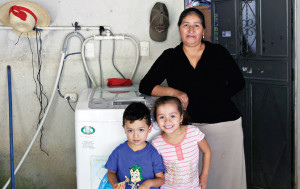
Juana Castillo, Aldea las Cuevas Guatemala
About 1.1 billion people in the world live without access to electricity, disproportionately hurting women and children more than any other group. Females are half of the global population, but nearly 75 percent live in energy poverty.
Juana Castillo, living in Aldea las Cuevas, Guatemala, used to be one of these women. Life changed for her three years ago. When electricity came to her village, no one could imagine the benefits it would bring, especially to the women and children.
According to the World Health Organization, a woman dies every minute from complications related to pregnancy or childbirth—often due to a lack of electricity and inadequate lighting.
According to the United Nations, when you add up the numbers, children spend up to 20 hours a week gathering water and fire- wood instead of going to school. And the smoke from cooking fires kills 4.3 million people a year, mainly women and children. But with access to safe, reliable and affordable electricity, women like Juana are receiving major opportunities to improve their health, education, safety, and socio- economic opportunity.
Today, the women and children in Juana’s family have many more hours a day to use as they please and are free from many of the physically demanding and traditional roles they once held. Three years after electricity was installed in her home, Juana, the family matriarch, is using common household appliances that have not just lightened the daily work load, but afforded her family a better quality of life.
The biggest change has been the electric corn mill. It used to take at least five hours to manually grind corn to help feed the 17 family members who eat their meals together. With the electric mill, the job is done in 15 minutes.
Juana’s five grandchildren now can use light to study after dark and no longer need to miss school or after school studies to gather wood for their families.
The smoke from cooking fires and candles used to cause frequent illnesses. Since switching to electricity, they hardly ever get sick. Given the limited availability of medication at the health center in their village, this is a critical development. Now, the improved health of her family reduces the costly trips to the hospital and gives her peace of mind.
The nearest market is an hour away from Juana’s village. Before electrification, fresh meats and produce could rarely be included in her family’s meals which were limited to tortillas, beans and corn. Today, Juana is able to freeze meats and refrigerate fruits and vegetables enabling her to provide more variety at mealtimes and improve her family’s diet and nutrition.
Juana and her family used to spend about US$25 a month on candles, flashlights and batteries. This amount that has been replaced by their monthly electric bill that ranges between US$16 to $18.
But the biggest improvement in Juana’s life isn’t just about money. Electricity has given her family and her community the opportunity to grow and flourish in a way never before possible. That’s what she looks forward to.